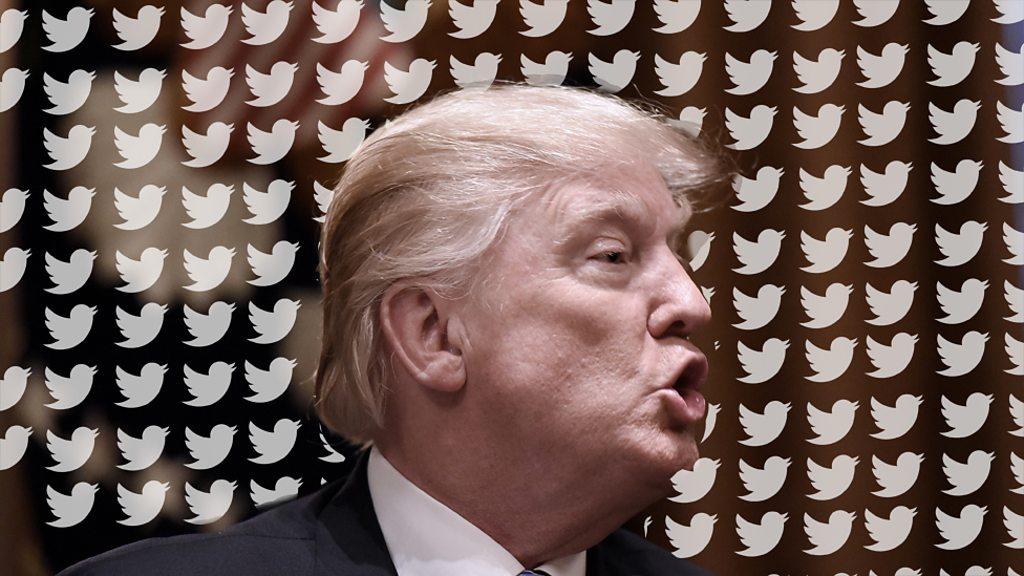Trump-Putin: Did dinner chat break diplomatic protocol?
- Published
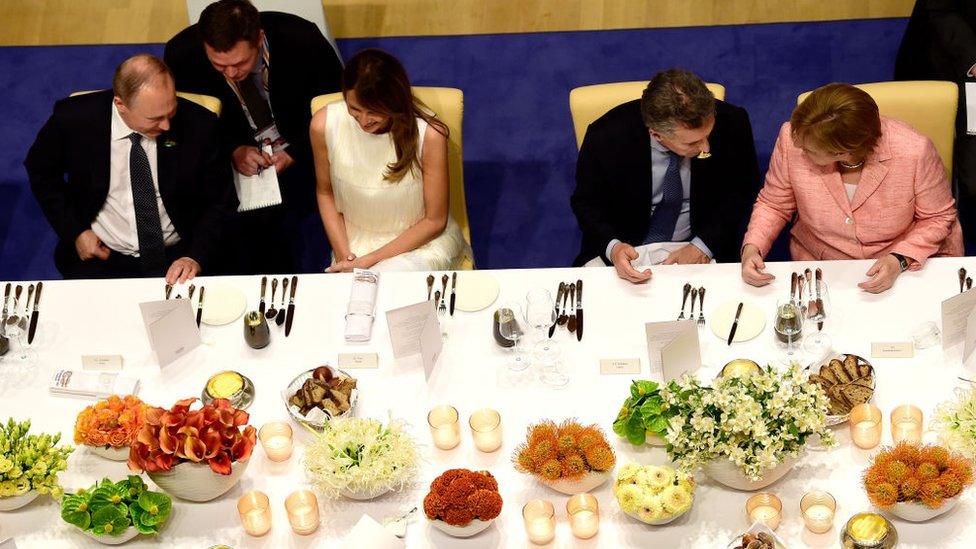
Vladimir Putin (left) was seated next to Melania Trump, and later Donald Trump walked over to speak to him
US President Donald Trump and Russia's President Vladimir Putin had a previously undisclosed conversation at a dinner of world leaders in Germany earlier this month.
The face-to-face came after a lengthy formal meeting earlier in the day that was the focus of much attention across the globe.
It remains unclear what was discussed. Journalists were not there and the pair spoke alone except for Mr Putin's interpreter, though they did remain in view of others.
According to US media, Mr Trump left his own seat at the table and moved next to Mr Putin, who had been seated next to Melania Trump.
Whether they talked at length for an hour, as reports say, or merely had a brief conversation, as the White House attests - the revelation has raised fresh scrutiny of a relationship that never seems to be out of the media glare.
But what is the diplomatic protocol at such events, and is what happened really so exceptional?
Context matters
Sir Andrew Wood, a former British ambassador to Russia, says it is not "terribly unusual" for one leader to approach another for a discussion at such a dinner, although they are usually "quite formal affairs".
But what does stand out is Mr Trump having relied on Mr Putin's interpreter, unless it was, as the White House argues, just a purely friendly and routine exchange as the US president made his way around the room.
Mr Trump, lacking diplomatic experience or perhaps simply not caring about the optics, may have acted "on a foolish whim" to approach Mr Putin, Sir Andrew says.
The White House says that Mr Trump only had a Japanese-speaking interpreter present because he was seated next to Akie Abe, the wife of Japanese Prime Minister Shinzo Abe.
Trump-Putin dinner talks highly unusual, says Ian Bremmer, who first reported the discussion
Sir Andrew adds that the fact that a Russian-speaking interpreter was not waiting in another room suggests the discussion was not "pre-planned".
Michael McFaul, who served as US ambassador to Russia from 2012-2014 and was on President Barack Obama's National Security Council before that, said on Twitter, external that Mr Obama and then Russian President Dmitry Medvedev had once met without an American interpreter during a "short pullaside" at a 2010 Nato Summit in Portugal.
Still, analysts say that given that Mr Trump and Mr Putin's earlier meeting at the G20 had attracted so much attention - with differing accounts of exactly what was said - and the ongoing US investigations into possible collusion between the Trump campaign and Russia, any discussion between the pair without US aides present was bound to lead to fevered speculation.
Vladimir Putin is, after all "not above being economical with the truth, and nor for that matter is Mr Trump," says Sir Andrew, now an associate fellow focused on Russia at think-tank Chatham House.
"I think it was unwise, if only because it gives rise to all this sort of questioning. And people aren't necessarily going to believe that Trump got whatever passed between them absolutely right, nor are they going to be sure that Putin would give a completely truthful account of it either."
Was a record kept?
Another former senior UK diplomat, who declined to be named, agreed that under normal circumstances - without the shadow of investigations into Russian connections hanging over Mr Trump - a short discussion between two leaders at a dinner would not be seen as out of place.
And they would not necessarily disclose it to the press.
"It does happen that people go off and they have these little side conversations," he says.
"And it does happen sometimes that you are in a format where there is not a note taker. And it does happen sometimes that you're in a format where the only interpreter you have is someone else's interpreter because your interpreter doesn't do the right language."
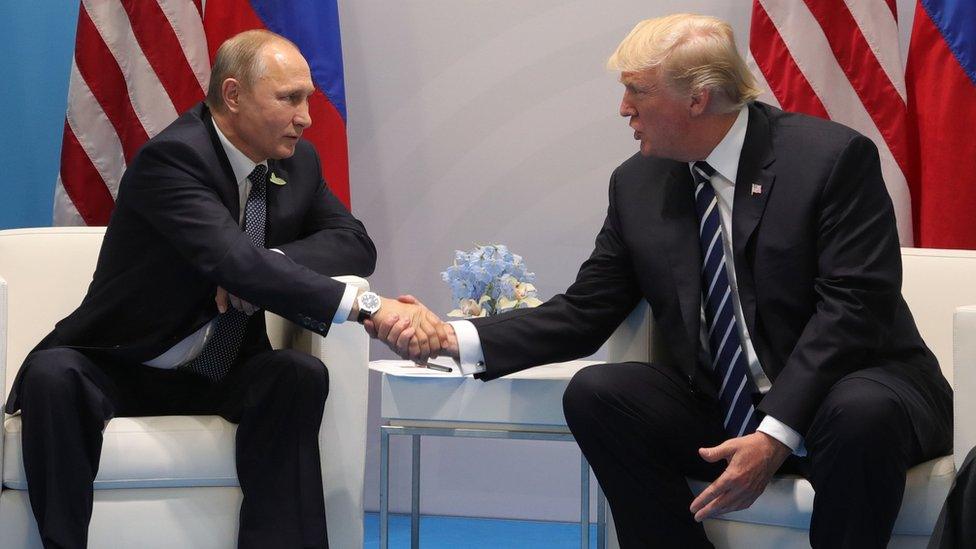
The second conversation between the two men was not captured by the cameras
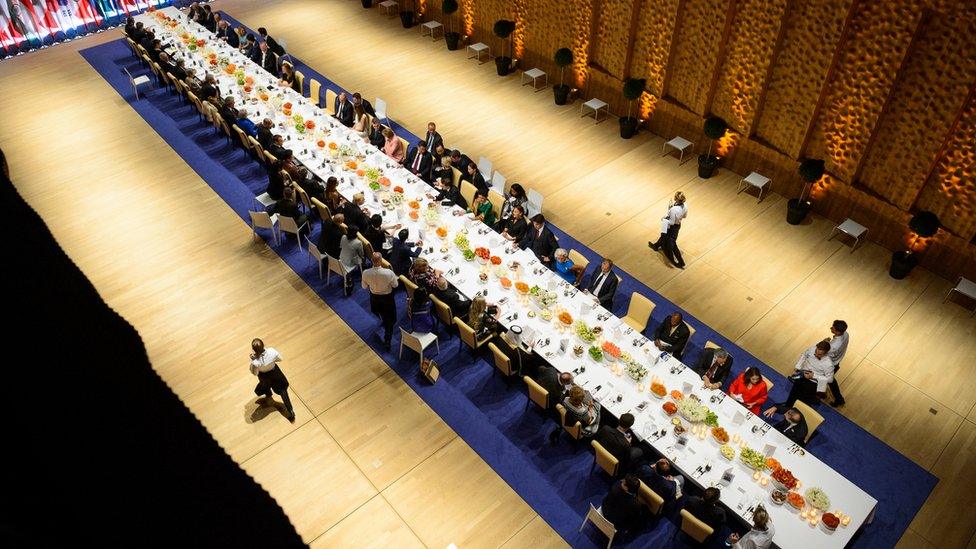
The dinner was attended by world leaders and their spouses
But what would happen in the UK government, he says, is that immediately after the discussion, a senior official would ask the prime minister exactly what was said and create a record of it.
"I think what is kind of dangerous is if that sort of thing doesn't happen and I suspect it doesn't happen with Donald Trump because he doesn't operate in that way."
He added that if the talk had really lasted an hour - as Ian Bremmer of the Eurasia Group consultancy, who first reported the undisclosed discussion, says - it would be "very odd" in the context of a formal leaders' dinner to "leave your place at the table" for that amount of time "to go and talk to someone because you want to talk to him".
And of course, that is not accounting for the fact that President Trump chose to go and talk to Mr Putin specifically when surrounded by other leaders, including those of key allies, he said.
Allow X content?
This article contains content provided by X. We ask for your permission before anything is loaded, as they may be using cookies and other technologies. You may want to read X’s cookie policy, external and privacy policy, external before accepting. To view this content choose ‘accept and continue’.
Allow X content?
This article contains content provided by X. We ask for your permission before anything is loaded, as they may be using cookies and other technologies. You may want to read X’s cookie policy, external and privacy policy, external before accepting. To view this content choose ‘accept and continue’.
White House officials say President Trump spoke with "many leaders" and a senior European official working for an unidentified government represented at the dinner also told the Washington Post he did not regard the face-to-face with Mr Putin as "a sensation".
White House officials have also pointed to the fact that Mr Trump has met other world leaders, including French President Emmanuel Macron and Indian Prime Minister Narendra Modi, without aides in the room.
But Mr Bremmer of the Eurasia Group says that G20 leaders were surprised by what had happened.
"I know a lot of people in that group, and many of them - including all of America's principal allies - they found it remarkable, they were concerned by it, it was noteworthy and so it got out," he told MSNBC, external.
He said Mr Trump and Mr Putin had had an "animated" and "extremely friendly" discussion in front of other leaders, though they could not be directly heard.
What does body language tell us about the Trump-Putin G20 meeting?
- Published19 July 2017
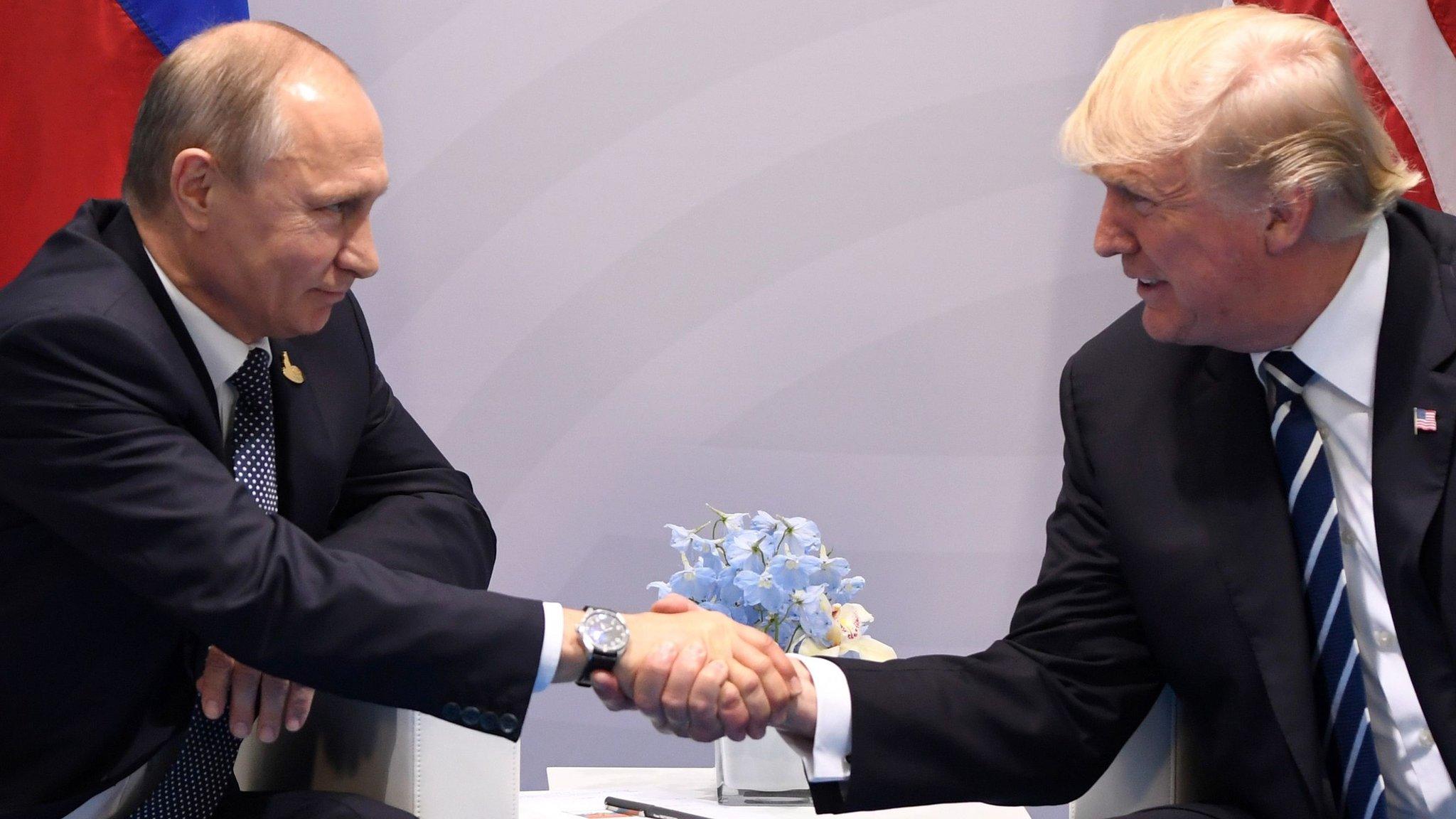
- Published6 July 2017
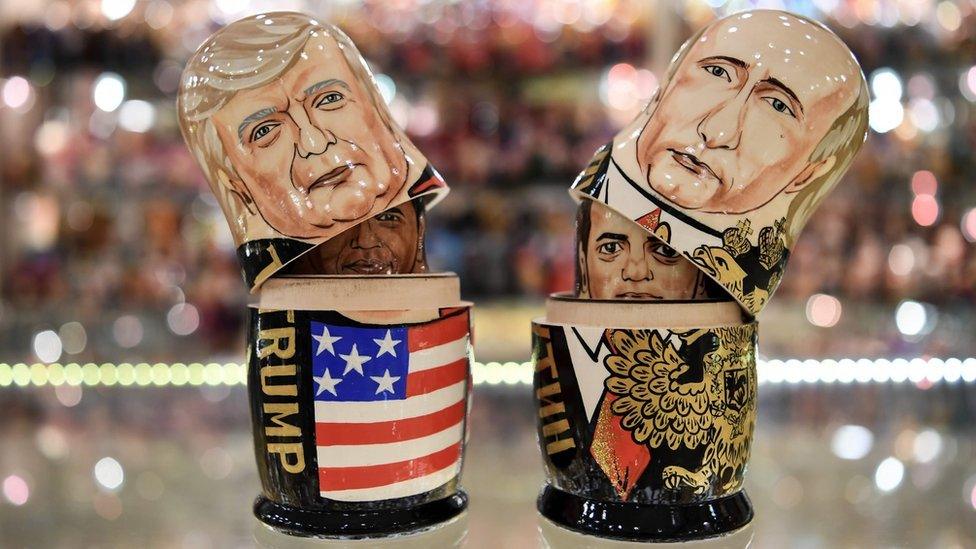
- Published14 September 2018
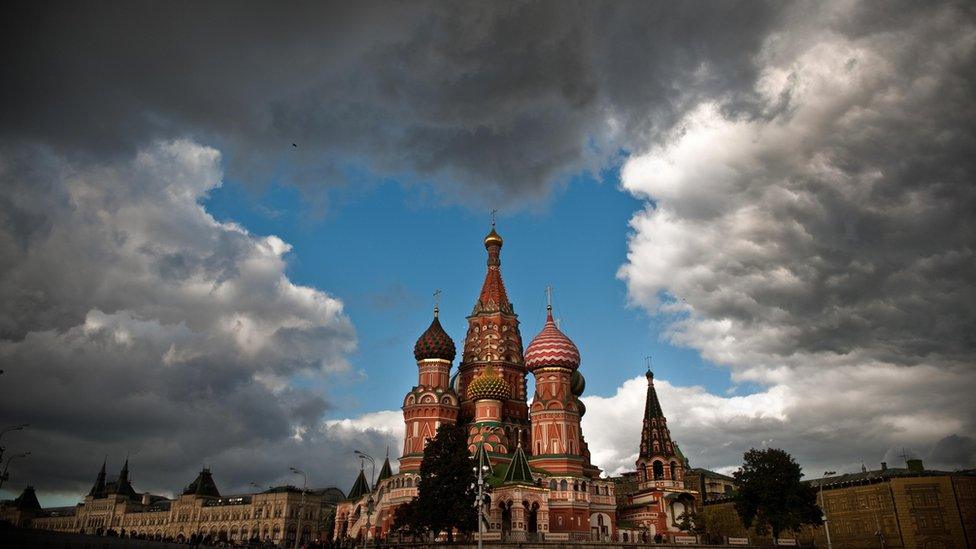
- Published6 July 2017
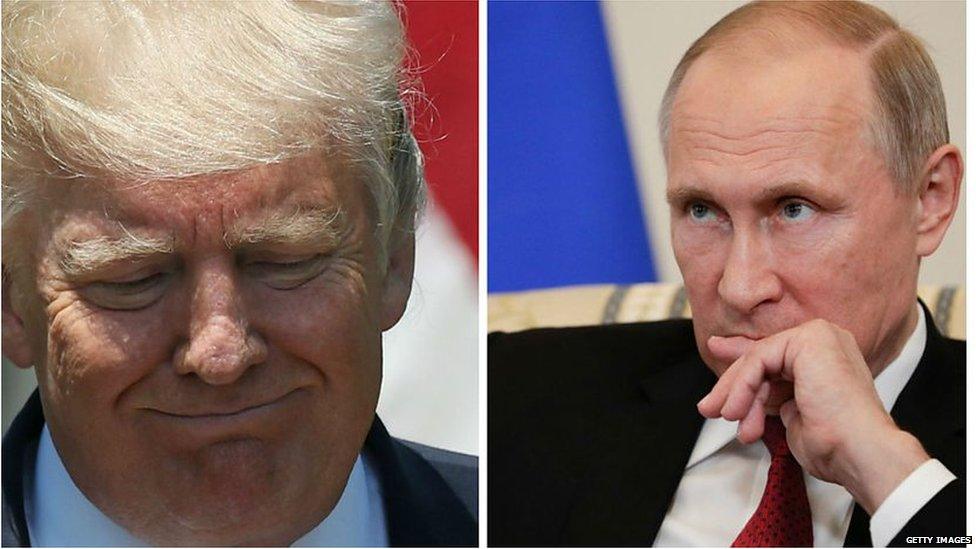
- Published19 July 2017
